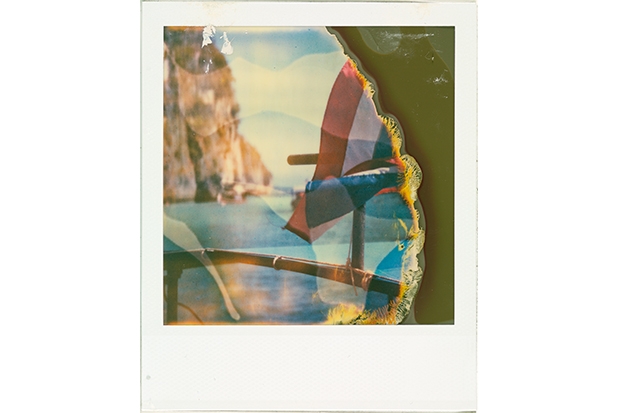Instant photography already existed long before Edwin Land, the ingenious inventor and founder of Polaroid, went for a walk with his daughter in Santa Fe in 1943. ‘Why can’t I see the pictures now?’ she asked her father on the way home. But the photographic systems available at that time were really just ‘experimental portable darkrooms’ rather than truly ‘instant cameras’.
Only a few hours after his daughter’s question, Land got hold of a patent lawyer and by Christmas the first test versions of ‘Polaroids’ had been developed in the lab.
Land was an incredible visionary. He was not just researching an innovative film system. He was on the hunt for a completely new tool for life. The best comparison is with Steve Jobs, who often mentioned Land as one of his most important role models.
In 1948 Polaroid introduced the first one-step-photography instant camera. It was big and heavy, weighing over 45 pounds, and not exactly a bargain at $89.75 (around $800 today). But within a few hours all 56 available cameras and all the available films had been sold. Over the next five years 900,000 more cameras flew off the shelves.
There was one essential aspect of this new kind of photography that Land had probably not taken into account: private erotic pictures. Before 1948 the privacy and intimacy of picture-taking was strictly limited to individuals who owned a fully equipped darkroom. Everybody else had to accept the disturbing fact that their images were shared with strangers the moment they dropped their films at the counter.
Suddenly all of this was gone and for the very first time in the history of photography people could capture the tension and fragile beauty of sexual moments without leaving the room. It is not an overstatement to compare the sexual impact of instant photography to the invention of the pill in 1960.
The magic of Polaroids is their uniqueness. Traditional photographs are by definition reprints from a negative. Polaroids are a one-of-a-kind painting, produced by light, which might be why artists were so drawn to it.
In 1955, Land hired the famous photographer Ansel Adams as artistic consultant. This was the beginning of a close cooperation between Polaroid and the art world, which resulted in the foundation of two legendary Polaroid Collections, in the US and Europe.
Steve Jobs once remarked admiringly: ‘Not only was Land one of the great inventors of our time but, more important, he saw the intersection of art and science and business and built an organisation to reflect that.’
Andy Warhol became perhaps the most famous Polaroid brand ambassador, shooting his famous portraits all day and night with his crazy Polaroid Super Shooter.
For many serious photographers, their first dance with Polaroid was the convenient and unromantic practice of taking test shots before switching to ‘real’ photographic high-quality materials. Most of these ended up in the trash only a few minutes later, their job done.
By the late 1970s more than a billion Polaroids were shot every year, and for decades a yearly average of over ten million packs of film were sold. There were more than 200 million cameras in circulation around the world.
Of all Polaroid’s business applications one field had particular importance to Edwin Land: medicine. Almost from the start, Polaroid spent millions on the development of scientific equipment that could improve all kinds of medical research and therapy. In the field of diagnostics the advantage of Polaroid film was especially obvious, dramatically speeding up the process. It also became the favourite documentation tool for eye doctors and dentists.
For decades the police force was one of Polaroid’s best friends. Every police car and insurance agent carried a Polaroid camera to document crime scenes and insurance claims. Because of their incorruptible character and their unalterable originality, Polaroids have always been accepted in court.
As the new millennium approached, however, the introduction of digital photography overturned the essential USP of Polaroid. There followed some devastating years, as Polaroid tried to fight this overpowering threat, which pushed the business into the depths of the mass market and brought about a decline in brand value. But Polaroid’s magic spell was still out there. Traces were everywhere. Advertising agencies started to fake Polaroids by putting a white frame around their all-too-clean digital images. The cultural omnipresence of Polaroid, even in these adverse market conditions, was a very clear sign to me that I wasn’t the only one to sense the mystic spell of something that had been declared obsolete. I quit my job and became Polaroid’s new evangelist.
Digital actually turned out to be a wonderful midwife for the rebirth of Polaroid. Polaroids had a deep impact on people who grew up in the digital age, who had never touched their images before, but just looked at them on their devices, always covered by a thin layer of glass. I only had to look at my own children, who loved their Polaroids from the very first moment, without any background nostalgia. Suddenly they had something in their hands, something to touch, collect, play with, shake and smell. Something to stick on their walls or hide in their diaries. The impact on them was even stronger than my own first experiences with Polaroids, because it was their first encounter with a real analogue picture. A picture not just visible to their eyes, but something to be discovered with all five senses.
My business was selling classic Polaroid film online to the new generation, and we were selling it as fast as we could get hold of it. And then, in February 2008, Polaroid released a short communiqué to the worldwide press: it was closing factories in Massachusetts, Mexico and the Netherlands and cutting 450 jobs.
I spent a desperate three months trying to find a way of rescuing film production. The only Polaroid executive who seemed to care was Paul Telford. Not only did he start to make arrangements for large quantities of the remaining stocks of Polaroid film to arrive in my warehouse, he also sent an official invitation to the closing event of the last Polaroid factory at Enschede
in Holland.
Tears were flowing, along with the formidable factory coffee and Grolsch lager, and I was starting to wonder if it really had been a good decision to come here. But that all changed the moment I was introduced to André Bosman, the general manager of the factory, who like me had not given up hope of keeping production alive, even though he had been ordered to start dismantling the assembly machines the following week. André took on the delicate task of stopping the external demolition team from entering the factory. Days later, the company’s US management called me to say that there was some kind of riot going on at the factory. André and his team had literally chained themselves to the machines to prevent demolition. At last I was able to convince the management to sit around the table to discuss the next possible steps.
Though we were being supported by a growing crowd of Polaroid lovers, gathering together online, it became more and more clear to me that we were trapped in a dead-end street. The final decision was in the hands of those who believed that there was not even the smallest possibility left of keeping film production alive and that there was no cure for the death of Polaroids.
It did not look good at all.
We were close to running out of arguments and energy when the FBI intervened. One glorious September day, they invaded the office of Tom Petters, the hyper-capitalist whose investment company had owned Polaroid since 2001, and took the whole Polaroid top management into custody. It was the day Polaroids got their second chance. Just five days later we were the new super-proud owners of the world’s very last Polaroid factory.






Comments